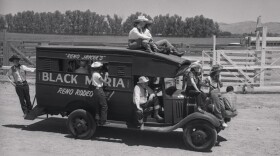Today, casinos are run by corporations that operate under a set of industry-wide standards and practices, but in the early days of Nevada gaming, the way a casino operated could tell you a lot about its owners. Historian Alicia Barber describes one notable example in this episode of Time & Place.
Gambling is, by definition, a risky business. That’s both the fun of it, and the potential danger. For more than four decades, Nevada was the only state with legal casinos, and that meant a steady stream of visitors who could easily get carried away by the novelty of poker tables and slot machines.
The concern that gamblers might get in over their heads weighed heavily on the minds of some early casino operators. Harolds Club, which was for decades Reno’s biggest and most successful casino, posted signs that read, “Please do not gamble more than you can afford to risk.” Of course, some customers would do it anyway, and in most casinos, they’d have to suffer the consequences.
But Harolds Club was run by the Smith family, whose patriarch, Raymond I. Smith, known by everyone as “Pappy," was as famous for his generosity as for his fun-loving personality. If you gambled away more than you could afford to lose at Harolds, Pappy wanted to know about it.

Harry Bergmann worked at Harolds Club in the 1960's, and for several years it was his job to meet with customers who had just gambled away their grocery money or car payments—or worse. First, he’d have them fill out a form listing how much money they had lost and the hardship that would result from it. Interviewed in 1999, Bergmann explained what happened next:
“I’d have to prove that they lost it. I’d take the man down, and I said, ‘You stand over there, where the dealers can see you,’ and I’d go in the pit and I’d say, ‘See the man over there?’ ‘Yes.’ ‘Did he lose any money?’ ‘Oh, yes, he lost umpteen dollars.’ "
After the dealer confirmed the loss, Bergmann had to evaluate the customer’s story of how damaging that loss would be to them. Then he would take the case up to the owners--Pappy or another member of the Smith family.
“They’d ask my opinion: ‘What do you think of this guy? Is he lying to us?’ ” Bergmann said.
If Bergmann vouched for the person, and everyone agreed, the club would refund the customer a percentage of the amount they’d lost, and sometimes, much more. Bergmann remembered one man who had gambled away thousands of his employers’ dollars that he was supposed to have deposited in a bank back in California. Bergmann took the case up to Pappy.
“I said, ‘That man lost that money, I proved it.’ And he says, ‘Fine.’ This was Pappy. ‘Give it all back to him.’ He says, ‘Nobody is gonna go to jail because they gambled at Harolds Club as long as I know about it.’ And he says, ‘You go get a cashier’s check made out to that bank so that he can’t gamble it.’ ”
Harolds Clubs’ customer refunds could total hundreds of thousands of dollars per year. The Smiths would also purchase bus tickets for out-of-town visitors who had gambled away their bus fare, so they could get home. Eventually, the club’s accountants put an end to the refunds. But to employees like Bergmann, the policy demonstrated two of the Smith family’s core beliefs: that gambling should above all be fun, and that everyone deserves a second chance.
Historian Alicia Barber is the author of Reno’s Big Gamble: Image and Reputation in the Biggest Little City. Oral history clips for this segment were provided by the Special Collections Department of the University of Nevada, Reno Libraries.






